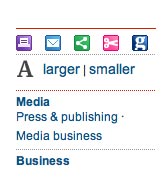Yesterday it arrived: the final version of the Digital Britain report. Landline users among us will have to sacrifice around three lattes a year to meet the 50p a month levy for the Next Generation Fund.
Director of digital content for Guardian News & Media, Emily Bell, asked, via Twitter, for two words to sum it up other than ‘colossal disappointment’. An advanced Twitter search showed these responses from her followers: ‘as expected,’ ‘damp squib,’ ‘disappointingly colossal,’ ‘wasted chance’ and ‘too cautious’. However, Bell is now worried she might have been ‘too negative’ in her reaction – but that could just be her going soft, she says.
Ten good links*:
- 1. Universal access of 2 Mbps by 2012, but will it be achievable, asks the Guardian’s Jemima Kiss.
- 2. ThinkBroadband’s summary. It’s clear and rectifies misunderstandings that might arise from second-hand summaries of the report.
- 3. Ben Bradshaw’s announcement in the House of Commons, ITN video on YouTube.
- 4. No word on Channel 4 or BBC Worldwide partnership, as reported by Paul McNally on the Press Gazette blog.
- 5. PageFlakes page with related links for Digital Britain content: including video, Twitter and blog searches.
- 7. The BBC opposes top-slicing of the licence fee for independent news consortia, stated by the Trust’s chair Michael Lyons in a BBC press release.
- 8. The paidContent:UK overall verdict is 7/10. Read it a bullet-point summary on the new-look site.
- 9. OFT report on local and regional media ownership rules released to coincide with Digital Britain report. Nothing will change. It’s a decision welcomed by the National Union of Journalists.
- 10. Oh, and the report itself, at this link.
*with an extra two, for luck.
